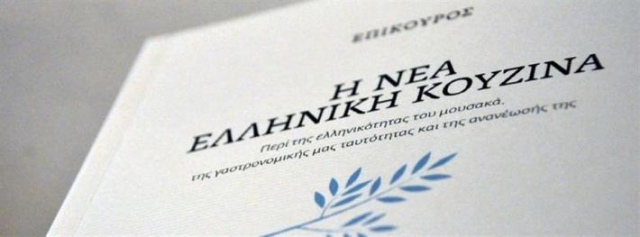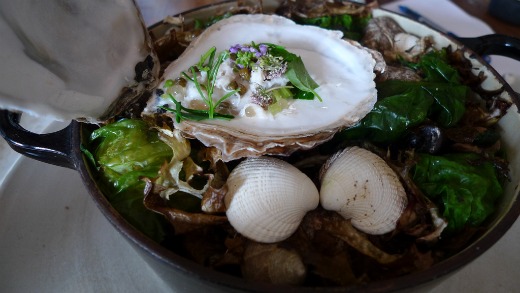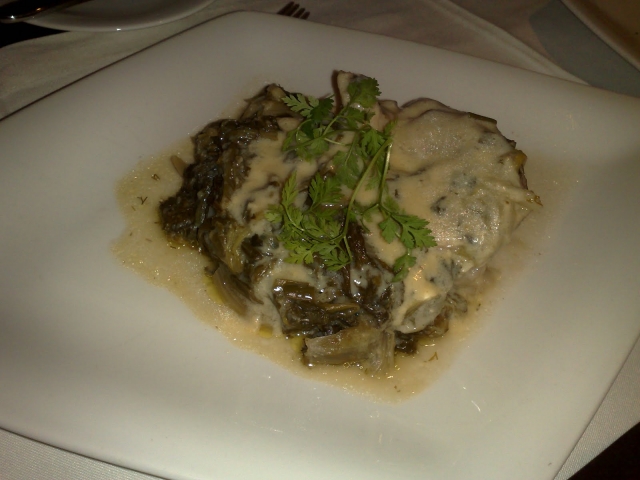Anastasia Balezdrova
What makes a dish national? How can the Greeks, for example, argue that moussaka is a national dish, since a few centuries ago, the main products used for its preparation: potatoes, tomatoes, eggplant were not even present in Europe? Yet, it is offered as a national dish to tourists, who taste the idea rather than the real taste of Greek cuisine.
"The truth is that very few of the dishes that are served in restaurants represent real Greek cuisine. Until a little more than ten years ago, no Greek dish could be found in the finest restaurants. They served a variety of fine French, Italian and other dishes, but not Greek ones. Cretan cuisine was the only exception to this rule. In this sense, wouldn’t someone claim after several years that sushi is part of Greek cuisine bearing in mind the pace with which the tastes and trends are spreading all over the world?", Alvertos Arukh provoked the audience during the presentation of his book" The New Greek Cuisine."

Several centuries BC, a sauce made from rotten fish waste was very popular among the Greeks, who consumed it with the frequency with which we consume ketchup nowadays. "The claim that moussaka is a Greek national dish would sound the same to them as the claim that sushi could be declared a Greek national dish after several years sounds to us today," said the writer and former professor of economics at the American College in Athens.
In recent years, however, there has been a trend of returning to old recipes and traditional products. "In fact, we owe it to the Spaniards. They were the first who began rejecting the French recipes and including updated traditional recipes in the menus. We see too how the new generation of chefs in Greece has been reviving the culinary identity, by modernizing the traditional dishes. They seek traditional products from different regions and include them in modern dishes," said Alvertos Arukh.
Strange as it may seem, the proof that this formula works comes from a country that is not very well known for its culinary tradition, namely Denmark. In Copenhagen, a restaurant named "Noma", after two Danish words - "nordisk" (Nordic) and "mad" (food), has held the title of the best restaurant in the world for three years already - 2010, 2011 and 2012. Its owner and chef, Rene Redzepi, who has also succeeded in winning two awards for gastronomy - Michelin stars, did nothing more than seek traditional products and recipes and create modern Danish cuisine on their basis.


On the other hand, globavorism of food is an undeniable fact that can hardly be changed. According to the experts, it has several negative effects, which cannot be ignored. "Small farmers suffer in economical terms, the products’ transportation and packaging pollutes the environment even more and the countries lose their uniqueness in the end," said professor of sociology Grigoris Katsas.
The opposite situation is called locavorism. The main motive is to consume local products and the arguments in its support are that this would help the local economy, protect the environment and preserve the culinary uniqueness of the country.
"Ultimately, it's almost impossible to be applied when not all products are available in every country in every season of the year. Moreover, no country has the amount of food, which is necessary to meet the needs of the population." So, in fact, imports cannot be avoided.
Moreover, globavorism brings not only economic but also qualitative changes in our diet. The first example is massification: fast-food chains and above all, the well-known American restaurants that offer the same products and taste worldwide. Hybridization comes next, which, in fact, is nothing more than the so-called fusion cuisine, i.e. the combination of elements of various culinary traditions. Domestication, in turn, is the process of adapting products from other countries to the local cuisine.

"And here we come to the question: How national is the national cuisine? Is the food we prepare at home from Italian recipes, Italian?" The question is rhetorical, but perhaps the example of Asian food that European restaurants offer and that is very different from the authentic recipes in Asia still gives an answer.
However, the rule that "a person is what he or she eats" has been proven, albeit in reverse order. Professor of Anthropology Simos Magliveras presented how one's way of thinking, whether a person is open or conservative and whether their contacts with other cultures influence the way they perceive a dish is indicative of their character.
"When we see what a dish looks like, we can understand the country or the continent of its origin. For example, a table full of dishes in small bites and dozens of bowls with sauces suggests Asian cuisine. "
The way we eat is also indicative of the culture of a community. "Let’s take the example of Indians who eat sitting on the ground and with their hands." Last but not least, he mentioned the rituals in the preparation and cooking of dishes, and the ritual slaughter of roosters or lamb roasting on a spit in Greece at Easter.

"The new Greek cuisine can help us find out who we are, understand the collective imagination and find ourselves in it. So, an increasing number of new restaurants have been rejecting risotto, replacing it with the traditional trahanas. They abandon the impressive foreign dishes and replace them with modest Greek dishes such as singlino (smoked pork – author’s note) with large beans, spinach with rice and cabbage with rice. Something that was unthinkable a few years ago," concludes Albertos Arukh.

So, if you visit Greece this summer look in guidebooks for restaurants offering authentic Greek traditional dishes and you will not regret your choice.